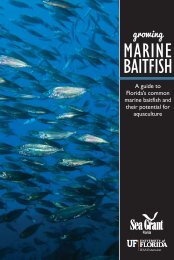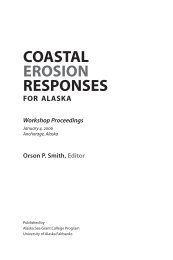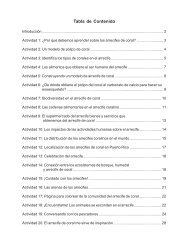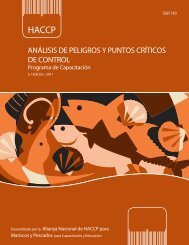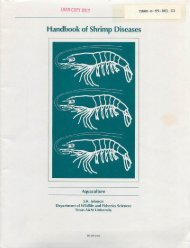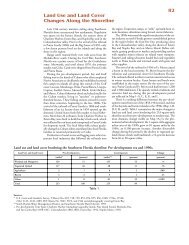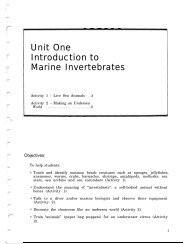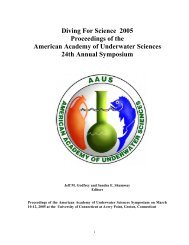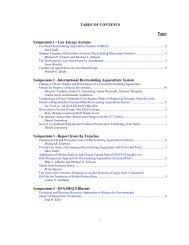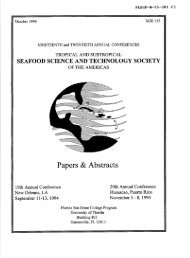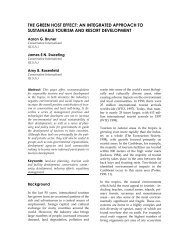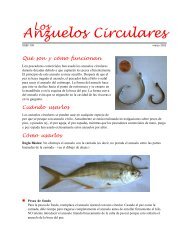Full document / COSOC-W-86-002 - the National Sea Grant Library
Full document / COSOC-W-86-002 - the National Sea Grant Library
Full document / COSOC-W-86-002 - the National Sea Grant Library
- TAGS
- nsgl.gso.uri.edu
Create successful ePaper yourself
Turn your PDF publications into a flip-book with our unique Google optimized e-Paper software.
698<br />
The answer to this question, as ve have soon, cannot be found in<br />
<strong>the</strong> biocentric/anthropocontrlc split among environmentalists. From<br />
ei<strong>the</strong>r point of view, <strong>the</strong> deep ocean is <strong>the</strong> best possible waste space<br />
on earth. The answer also does not come from <strong>the</strong> dispersion vs.<br />
concentration views of waste disposal, for placing radwastc on Land<br />
sites or within <strong>the</strong> daap-seabed both necessitate concentration and<br />
Isolation ra<strong>the</strong>r than dlsporslon.<br />
Instead, <strong>the</strong> answer seems to come from three sources. One is <strong>the</strong><br />
policy argument discussed above; it centers on <strong>the</strong> debate whe<strong>the</strong>r it is<br />
better to get rid of dangerous wastes by placing <strong>the</strong>m forever beyond<br />
our easy reach, or by keeping <strong>the</strong>m close where ve can watch <strong>the</strong>m. The<br />
o<strong>the</strong>r two objections are ethical arguments, and <strong>the</strong>y have little to do<br />
with remoteness or nearness to human activities, food chains and life<br />
processes. These arguments would oppose deep-ocean disposal of wastes<br />
even if it could be shown that hazards could be effectively contained<br />
and no biological comunltles would be endangered <strong>the</strong>reby. The<br />
arguments fall under two labels: (1) wilderness preservation—<strong>the</strong><br />
argument that we have a duty to guard against fur<strong>the</strong>r human<br />
encroachment upon natural areas that are now relatively unspoiled by<br />
human activity—and (2) "rights" for natural objects—<strong>the</strong> argument that<br />
natural features of tho earth have certain "rights" that need to be<br />
protected. Those vho vould raise ei<strong>the</strong>r of <strong>the</strong>se objections arc as yet<br />
a distinct minority among environmentalists.<br />
Wilderness argument<br />
The first type of environmentalist vho opposes dccp-occan dumping<br />
is what is ordinarily called a wilderness advocate. They vould extend<br />
protection not only to productive areas like <strong>the</strong> Amazon Basin, but also<br />
to unproductive areas like <strong>the</strong> Antarctic icecap and <strong>the</strong> deep ocean<br />
basins. Wilderness advocates are well-known to resource managers and<br />
policymakers, and require no fur<strong>the</strong>r discussion hero.<br />
"Rights" argument<br />
The o<strong>the</strong>r typo—those who vould recognize moral rights In<br />
Inanimate objects—are still relatively unfamiliar, and may require<br />
discussion. Environmentalists in this category presume <strong>the</strong> existence<br />
of an ethical hierarchy that is unfamiliar to most of us and<br />
incomprehensible to some. In <strong>the</strong> West, we are not used to taking<br />
seriously <strong>the</strong> idea that natural objects may have a moral claim on us.<br />
We tend to dismiss that notion as a superstition peculiar to Buddhism,<br />
Druldism or American Indian religions.<br />
Everyone agrees that human beings have rights, both legal and<br />
moral, though <strong>the</strong> extant of those rights is of course open to<br />
discussion. Similarly, nearly everyone agrees that higher animals have<br />
some limited rights; tho law does not allow pets or useful domestic<br />
animals to be cruelly mistreated, for example. Cruelty Co higher<br />
animals is now seen as an offense to <strong>the</strong> animal ra<strong>the</strong>r than to its<br />
owner, and most of us grant domestic animals a place in our hierarchy<br />
of moral obligations.<br />
For most people, however, this ethical hierarchy stops when ve get<br />
below Flipper or Snoopy or Smokcy <strong>the</strong> Bear. Tho consensus disappears<br />
when we consider higher animals, like wolves or saa lions, that may<br />
directly compete vlth our Interests, or higher animals, such as monkeys<br />
or apes, that are useful as laboratory animals. But a solid minority<br />
among us believes that certain rights should be extended to predators.



